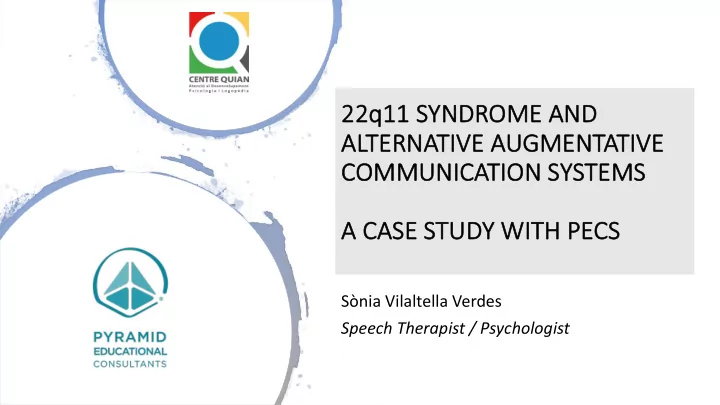

22q 22q11 S 11 SYN YNDROME AN AND AL ALTE TERN RNATIV TIVE A AUG UGMENTATIV TIVE COMMUNICA CATI TION S SYSTE TEMS A CAS A CASE S STUD TUDY W Y WITH P ITH PECS CS Sònia Vilaltella Verdes Speech Therapist / Psychologist
PE PECS: Picture Exchange Communication System • Alternative/augmentative communication system based on pictures • Development began on 1985 • Based on principles of Applied Behavior Analysis and on B. F. Skinner’s 1957 book, Verbal Behavior • Research based • 6 phases to teach the student to communicate (from requests to comments) • No academic or cognitive prerequisites • It can be done on low technology (paper) or high technology (digital) (Frost & Bondy, 1994)
9 Critical Communication Skills Expressive Receptive 1. Respond to “ wait ” or “ no ” 1. Request reinforcers 2. Respond to directions 2. Request assistance 3. Follow a schedule 3. Request a break 4. Transition 4. Accept 5. Reject (Frost & Bondy, 1994)
22q11 Syndrome, clinical aspects • Differences in physical • Palate and speech impairment appearance • Deafness • Difficulties in nutrition and • Psychomotor delays growth • Learning difficulties (language and • Congenital heart defects behavior) • Immunodeficiency • Comorbid psychiatric pathology • Hypocalcemia • Genitourinary involvement • Skeletal abnormalities Cognitive and Social Development, 22q11 Congress, Barcelona 2016
• 22q11 Syndrome • Non verbal • Inappropiate behaviors: punches herself on the head and bites herself • Use of pictures but without a teaching protocol First visit: and refuses them • Doesn’t wait 15/4/16 • Doesn’t ask for help (8y.2m.) • Doesn’t accept when told “no” • Doesn’t now how to say yes neither how to refuse • Has a picture schedule but not used on transition moments • Repetitive behaviors, posible OCD (related to food and order)
-Great family and school support -Lack of communicative - Extraordinary personality skills - Excess of inappropiate behaviors Mirenda, 2003
Previous communication skills
Expressive skills today: • Increase of demands and comments • Transition to a Voice Output Communication Device • Reduction of behaviors related to expressive communication such as needs or pain • Introduction of academic-literacy VULL MIRAR LA TABLET AMB “OS CASA BLAVA” (reading) and self-management skills
Receptive skills today • Skills used on the community, accepts “no” and “wait” • Self-management skills, following schedules and visual instructions • Reduction of behaviors related to frustration and possible OCD
svilatella@pecs.com www.pecs-spain.com www.centrequian.com
Recommend
More recommend